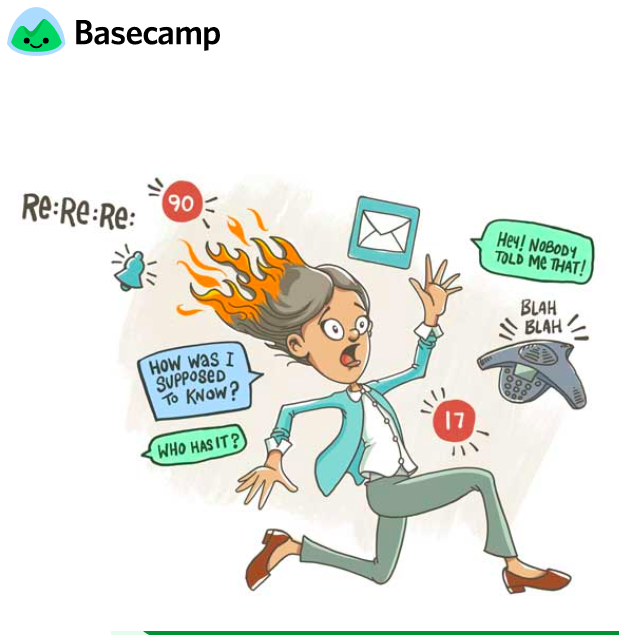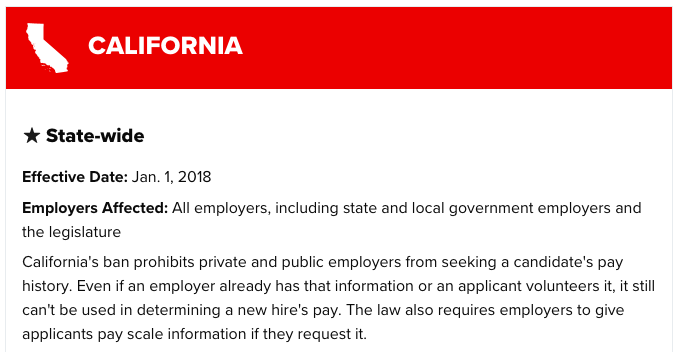Successful interviews should accomplish two goals: getting the best out of the person being interviewed and selling your company as a place where they want to work. In fact, nine in ten people (91%) say the interview process influences their opinion of a company.
If you ask the same questions everyone else does — you know which ones I’m talking about — you aren’t doing much to create a positive reaction to your company. Worse, you’ll be getting the same canned answers that candidates have dished out at their last five interviews.
Asking these seven questions instead will give your interviewees a chance to showcase their talents, discuss the marketing industry and, quite possibly, teach you a thing or two in the process.
Question #1: What do you read to enhance your skills and understanding of the field?
Marketing is ever-evolving, and if a candidate isn’t keeping up with the changes, you should think twice about letting them advance through the interview process.

A red flag for me is when someone says they don’t read marketing blogs (and that’s not just because I write one!). The good marketing blogs have some of the most up-to-date, comprehensive information about everything new in marketing that’s out there. Magazines and journals have long lead times, so by the time you read an article, it’s already out of date.
I’ve heard some candidates say that they prefer to learn by doing. You should be learning by doing. But you should also be reading and learning from other people with more experience and better insights. If you’re not, you aren’t growing as a marketer, and no one wants to hire a marketer that’s averse to growth.
I’m the owner of a digital marketing company and I still consume media about marketing every single day. I read blogs. I watch videos. I listen to podcasts. It’s time consuming, and it’s not like I have a ton of extra time in my day while running two businesses. But it’s what you have to do if you want to succeed in marketing.
When asking this question in an interview, include follow-up questions about any website or podcast they mention to find out how much they’re really consuming marketing content (or whether they’re just paying lip service by mentioning popular publications). And throw out a couple of interesting things you’ve read lately to see if it sparks a meaningful discussion.
Dive Deeper:
- Hiring Great Marketers & Why You Should Encourage Side Hustling
- Forced Hiring: An Amazingly Effective Way To Find The Best Hires
- How to Conduct Effective Interviews to Get the Best Hire
Question #2: What would you change about our business/marketing?

When you ask this question, know that candidates will be conservative in their answers. No one wants to feel like they’re slamming a company they hope to work for. But conservative or not, they should have answers.
The reason I ask this question is because if a candidate can’t tell you specifically what they would fix or change or make better about your business, then how can you expect them to perform if you do decide to bring them on? The last thing you want to do is hire people who don’t have any vision or who are content to just be told what to do.
I’ve had people answer this question by telling me they haven’t had a chance to look at the website or do any research, and that’s a huge red flag for me. In some cases, that can disqualify a candidate right there. But if I like them, I might say, “No worries. Here’s my laptop. Browse the site. Tell me what you would change.” This is a good way to see if they can think on the spot and figure out things on their own. If they have real expertise, it will show.
If you’re interviewing for a position, do your homework. Because I’d have to really like you to have you browse the website during the interview, and most interviewers wouldn’t even do that.
Question #3: Would you be open to a trial assignment?
Marketing assessments are a great way to get a sense of what value a candidate could bring to the company as an employee. These tests can be short and sweet or more in-depth, depending on the type of worker you’re hiring. A short test could be writing some copy for a Facebook ad; something more in-depth could be creating a social media strategy for a marketing campaign or writing a blog post.
If I’m asking a candidate to do a time-consuming trial, I pay them for their time. I think it’s the right thing to do, and it’s easy to set up through Basecamp.

You don’t want to be shelling out money for people you have no intention of hiring, of course, so save this step for when you’re down to the final two or three. But gauging their interest in the idea earlier in the interview process will give you a good sense of how interested they are in working for you.
Another assessment I like to do is to have the interviewee come in to the office for a couple of hours and solve some problems for a fictional company. I have them put something together and then present it to me. It’s a great way to learn:
- How they think about things
- How they are at presentations
- How much they know
It goes a lot further than just asking them questions during an interview.
Question #4: What do you do when an experiment fails?
This is one of my favorite questions, and it’s an interesting way to understand their thought process. In marketing, in every department, everyone runs experiments. And not all of those experiments are going to be a win.
I want to know how a candidate looks at failure, learns from it, documents it, shares it… everything. This is all really valuable because if people are experimenting in a vacuum and keeping their insights to themselves because they don’t want anyone to know they failed, then they’re setting everyone else up to repeat the same failure.
You want to make sure that the people on your team are learning from each other and collaborating. That way, when they’re running campaigns and experiments, there’s a higher probability that they’ll succeed. But in order for that to work, team members have to see failure as just another data point, rather than an unforgivable error.
Question #5: If you had $10 million, in which companies would you invest?
There are a lot of useful insights to be gained from asking this question, including how arrogant or humble a candidate is.

What I’m looking for in potential employees is people who are hungry and smart. The types of companies they’d like to invest in if they had the money tells me what they value. Is it just about making money? Is it about solving everyday problems? Is it about changing the world? All those options tell me something about the person I’m interviewing, including whether or not I want them on my team.
Historically, this has been a question I’ve reserved for executive-level candidates, but I’ve started asking it of more junior people recently because it’s such a good question.
Question #6: What are our competitors doing that we aren’t, but should be?
Hopefully the candidate you’re interviewing has already researched your competitors. This question helps you to see if they have the analytical chops required to be on your marketing team.
When I get good answers to this question, I get to evaluate how the person can look at other sites, compile data and spit it out in an actionable way. Once they do that, I then ask them to organize it in terms of short-run, medium-run and long-run solutions and give me a timeline for implementation.
The two-part nature of the question is important. The first part helps me analyze how they think and the second helps me understand whether or not they are realistic about timelines and budgets, and how they’re able to prioritize. I want to know if they know what will have the biggest impact now, what can wait until later, and why.
Dive Deeper:
- How to Find and Hire a VP of Growth for Your Business
- Why Didier Elzinga Asks New Hires How He Can Help Them Get Their Next Job (podcast)
- How to Onboard New Hires
Question #7: What is your most impressive marketing accomplishment?
This is a question that, in my opinion, every candidate that comes into your office for an interview should be able to answer — and answer it well. It’s their chance to tout their knowledge and experience, and really shine.
On my end, I learn something important about the interviewee, which is what they find impressive. And then I go deeper, and ask follow-up questions like:
- Why do you think that’s impressive?
- What did you do specifically?
- Who else worked on the project, and what was their contribution?
- What part did you fail at?
As you talk through these deeper questions, you’ll start to scrape away at the surface layer to find out more about who they are and, again, how they think. How they think is probably the most important aspect, which is why I make sure to try to get there from several different angles in an interview setting.
If you trust how they think as a marketer, they’ll probably be a good addition to your team. If you get no real insight into how they think from their answers, it’s probably time to cut them loose.
9 Things You Should Never Ask in an Interview
We’ve covered the things you should definitely ask, but we should probably also get into the things you definitely shouldn’t ask. You’re opening yourself up to a lot of legal trouble if you ask the wrong questions.
I know I criticized the “strengths, weaknesses and where you see yourself in five years” questions above, but those aren’t illegal, just ill-advised. Beyond that, however, be aware that the Equal Employment Opportunity Commission (EEOC) has laws about what you can and can’t ask during an interview.
Any questions related to these nine topics are big no-nos:
- Race
- Color
- Religion
- Sex (including gender identity and sexual orientation)
- National origin
- Age
- Disability (except to ask if an applicant requires a reasonable accommodation)
- Genetic information (medical history or results of genetic tests)
- Pregnancy (including whether a candidate is pregnant or plans to become pregnant)
Several states and municipalities have also outlawed asking about an applicant’s previous salary, so make sure you know what the requirements are for where you live, as well as any other location-specific guidelines. Here’s a list of the states that have banned asking about salary:

Not knowing these laws and breaking them (even accidentally) can open you up to lawsuits from people who interviewed and weren’t hired, were hired and fired, or employees who are otherwise disgruntled.
Dive Deeper:
- How AI Can Help Both Recruiters and Job Candidates
- 8 Videos You Can Generate from One Interview with Your CEO
Hiring Your Next Marketing Superstar
Interviewing potential marketing candidates isn’t just about learning who they are and how they can help your team. It’s also about showing them that your company is the one they should be excited to work for, since the most talented candidates are likely going to be fielding multiple offers from different employers.
Hiring is neither a fast nor easy process. And it shouldn’t be. Making a commitment to a worker is a big deal, which is why learning to ask the right questions — and to avoid the ones that can get you in trouble — is critical for building a winning marketing team.



